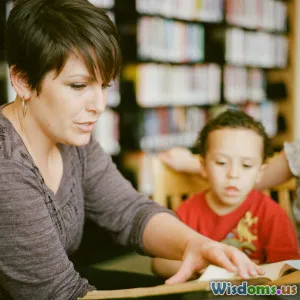
What Not to Do When Supporting Kids Through Loss
7 min read Discover essential avoidances when supporting grieving children to foster healing and understanding during tough times. (0 Reviews)
Understanding What Not to Do When Supporting Kids Through Loss
Losing a loved one is hard. For children, it can be even more confusing and painful. As adults, whether parents, teachers, or caregivers, our role is crucial in guiding them through grief. However, the path is riddled with potential missteps that may unintentionally do more harm than good. In this comprehensive article, we explore what not to do when supporting kids through loss, helping to create a nurturing, honest, and healing environment.
The Impact of Loss on Children
Children process grief differently than adults. Research from the American Psychological Association notes that children's comprehension of death and their emotional response varies greatly with age, developmental stage, and personality. Younger kids might see death as temporary; teenagers might experience isolation or anger.
Without proper guidance, kids might develop anxiety, depression, or behavioral problems. Understanding what to avoid is as important as knowing how to support them.
1. Do Not Avoid Talking About the Loss
Why avoidance is harmful: When adults avoid discussing death, children sense the tension but don’t receive clear information. This can result in confusion, feelings of abandonment, or misconceptions rooted in fear.
Example: A 7-year-old girl whose father passed away was always told, "He is just sleeping." This led to bedtime fears and a false understanding of death’s permanence.
Better approach: Use age-appropriate language and honest conversations. Let children ask questions and express their feelings freely. According to Dr. Alan Wolfelt, a renowned grief counselor, "Honest and open communication is the foundation of healthy grieving for children."
2. Do Not Dismiss or Minimize Their Feelings
Why it's damaging: Phrases like "You’ll get over it," or "Don’t be sad," can invalidate a child’s natural emotions. This may cause children to suppress feelings, leading to emotional repression or delayed grief.
Real-world insight: A study published in the Journal of Child Psychology highlighted that children who felt unheard during bereavement often acted out in school or withdrew socially.
Better approach: Acknowledge their feelings without judgment. Say things like, "It’s okay to feel sad or angry, I’m here with you."
3. Do Not Impose Adult Expectations on Their Grieving Process
Every child grieves uniquely. Expecting them to process loss "quickly," or in the same way as adults, disregards their needs.
Example: A teenager expected to attend all family mourning rituals without allowances for their distress may become resentful or isolated.
Better approach: Be flexible and observant. Allow children to express grief in their own way—drawing, playing, crying, or talking. Encourage but do not force participation in mourning rituals.
4. Do Not Hide Your Own Emotions or Pretend to Be Unaffected
Why this matters: Children look to adults as emotional guides. If they perceive adults as concealing grief or pretending everything is fine, they may feel they also must suppress their feelings.
Expert insight: Psychologist Dr. Maureen Krey explains, "When caregivers show vulnerability appropriately, children learn it’s safe to express emotions."
Better approach: Model healthy grieving. Share your feelings gently and reassure children it’s normal to be upset.
5. Do Not Ignore Routine and Stability
While grief disrupts life, removing all routines can lead to increased anxiety.
Example: A family stopped all school-related activities after a grandparent’s death, intending to protect the child, but this isolation ultimately worsened the child's distress.
Better approach: Maintain consistent routines around meals, school, and bedtime, providing a sense of security and normalcy.
6. Do Not Overwhelm the Child With Excessive Sympathy or Pity
Though well-meaning, excessive pity may make children feel labeled as fragile or helpless.
Observation: Children surrounded by ceaseless sympathy may withdraw or exhibit regressive behaviors as attention-seeking.
Better approach: Show empathy balanced with encouragement. Promote resilience by helping them engage in hobbies and social activities.
7. Do Not Use Euphemisms or Vague Language About Death
Using terms like "passed on" or "went away" can confuse children about the reality of death and hinder their ability to process it.
Example: Children may develop fears about sleep or separations if told, "Grandma is sleeping now."
Better approach: Use clear, concrete language such as "died" and explain what death means in simple terms.
8. Do Not Forget the Importance of Asking for Professional Help When Needed
Some losses lead to complicated grief, and children may need expert support.
Fact: The National Child Traumatic Stress Network underscores that timely therapy can prevent long-term emotional challenges.
Better approach: If signs like prolonged depression, extreme withdrawal, or behavioral problems persist, seek a child psychologist or counselor specializing in grief support.
Conclusion: Cultivating Compassionate Support
Supporting children through loss requires sensitivity and awareness. Avoiding silence, minimizing feelings, rigid expectations, or concealing your emotions can create barriers to healthy grieving. Instead, open communication, validation, flexibility, and stability create an environment where children can heal.
Remember, grief is not a race. Providing a safe space for children to express their feelings honestly is one of the greatest gifts we can offer in their journey toward acceptance and peace.
Resources:
- American Psychological Association: Helping Children Cope With Loss
- National Child Traumatic Stress Network: Grief and Trauma Resources
- Dr. Alan Wolfelt’s Center for Loss and Life Transition
By intentionally avoiding common mistakes and embracing compassionate strategies, we equip children not just to survive their loss, but to grow stronger through it.
Rate the Post
User Reviews
Popular Posts
















